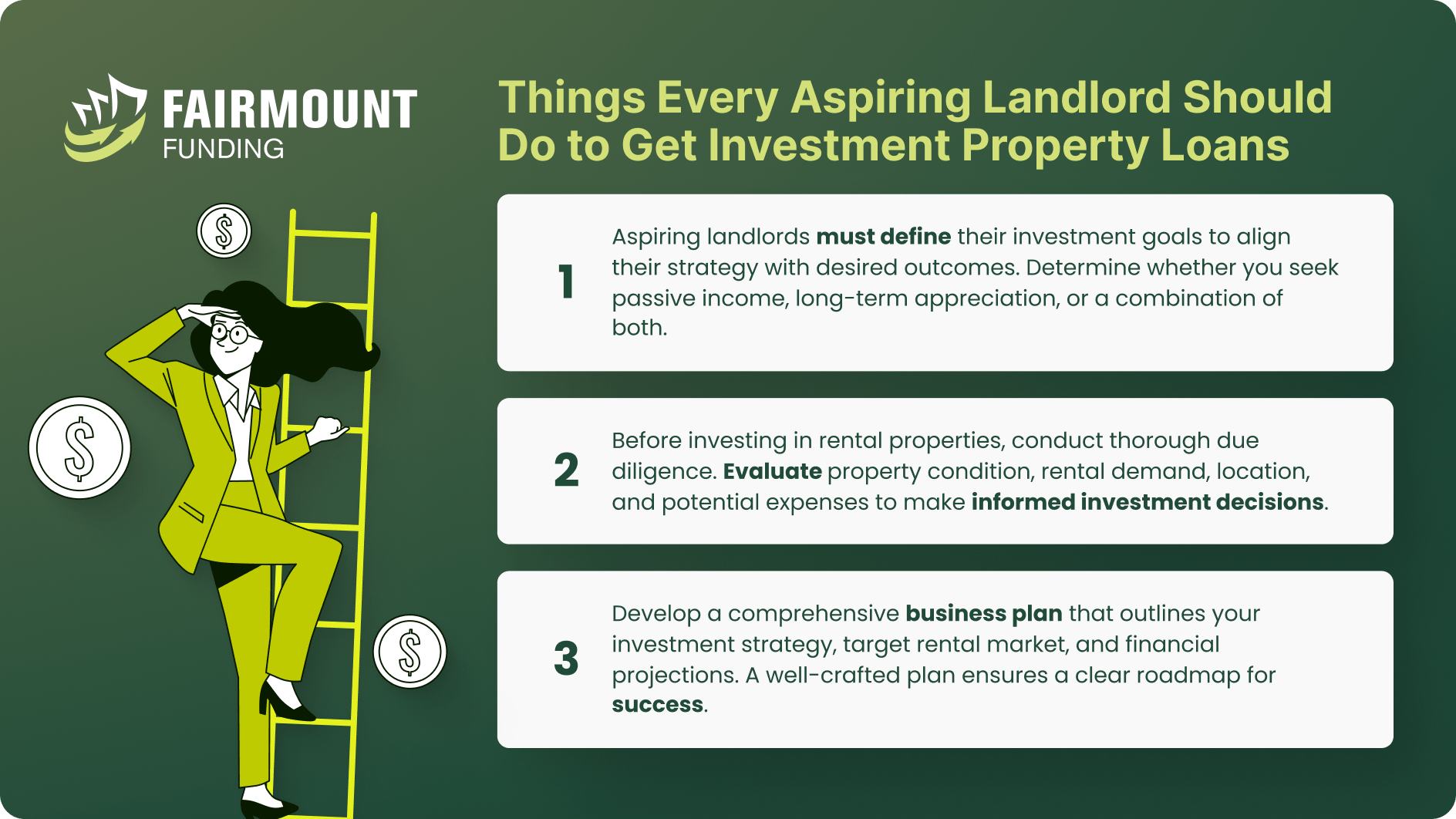
Investment property loans are essential for people looking to venture into real estate. Whether you are a seasoned investor keen to expand your portfolio, or a first-time buyer considering the potential of rental properties, understanding the nuances of investment property loans is paramount.
For one, an investment property loan considers the property’s potential rental income and your financial profile. Lenders assess the property’s value and the borrower’s ability to manage multiple properties, making it vital to have a clear strategy and a solid credit history.
As the real estate market offers opportunities for wealth-building, understanding various loans related to your investment property can help you make informed financial decisions. In this post, we will discuss the different types of investment property loans and how you can secure them to fund your next real estate venture.
What is an investment property loan?
An investment property loan refers to a specialized type of mortgage designed to facilitate the acquisition of real estate properties. Often, the purpose of buying a real estate asset is to generate rental income or capital appreciation. These real estate investment loans provide the capital needed to acquire the property, while the generated rental income can cover the loan payments and operating expenses.
In line with this, an investment property could be single-family homes, multi-unit apartments, condominiums, commercial buildings, or vacation rentals. Regardless, the success of an investment property hinges on its location, market demand, property management, and rental income growth potential. This explains why real estate investors must carefully assess the property’s income potential and long-term appreciation prospects.
Different Types of Investment Property Loans
Each type of property investment loan offers unique advantages that cater to various investor goals, financial situations, and property types. Investors must thoroughly research and understand these options before selecting the most suitable loan for their investment strategy.
- Conventional Investment Property Loan. A standard mortgage offered by traditional lenders for purchasing investment properties. It typically requires a down payment of 15% to 25% and follows conventional mortgage guidelines.
- Hard Money Loan. A short-term, high-interest loan that real estate investors often use for quick acquisitions or renovations. Often used for rental property financing, these loans are asset-based. This means the loan relies on the property’s value rather than the borrower’s creditworthiness.
- Fix-and-Flip Loan. This rehab loan for investors is meant for purchasing, renovating, and selling properties. A fix-and-flip loan covers the property acquisition and renovation costs, with repayment expected after the property is sold.
- Blanket Loan. Useful for investors with multiple properties, a blanket loan covers several properties under a single mortgage. It simplifies management but can be risky if one property underperforms.
- Home Equity Line of Credit (HELOC). Utilizes the equity in an existing property to secure a line of credit, which helps purchase investment properties. Interest rates are often variable, and the borrower must have substantial equity.
- Seller Financing. Involves the property seller acting as the lender, allowing the buyer to pay directly to them. This option can provide flexibility in terms and qualifying criteria.
6 Steps to Get an Investment Property Loan
Understanding the loan process and working closely with a lender will help ensure a smooth and successful application and property purchase. Here are the steps you must follow when applying for an investment property loan.
Step 1: Look for Investment Property Lenders
Research and identify lenders that specialize in investment property loans. You can apply to banks, credit unions, online lenders, and mortgage brokers. Compare their requirements, terms, interest rates, and fees to find the one that aligns with your investment goals and financial situation.
Step 2: Fill Out and Submit Your Application
Complete the investment property loan requirements, providing accurate and comprehensive information about your financial history, income, assets, and the investment property you intend to purchase. Be prepared to supply documents such as tax returns, pay stubs, bank statements, and details about the property’s purchase agreement.
Step 3: Pay for the Investment Appraisal
After reviewing your loan application, the lender may require an appraisal of the investment property. An appraiser will assess the property’s value to ensure it aligns with the loan amount. You will likely need to cover the appraisal cost, which can vary based on the property’s location and complexity.
Step 4: Check Your Closing Disclosure
Once the lender approves your loan and finalizes the terms, you will receive a Closing Disclosure. This document outlines the loan details, including the interest rate, monthly payment, closing costs, and additional fees. Please review it carefully to ensure accuracy and to confirm that the terms match what you agreed upon.
Step 5: Gather Your Funds
Before closing, you will need to gather the necessary funds for the down payment, closing costs, and any prepaid expenses. Ensure that the funds are available in your bank account, as you may need to provide proof of these funds to the lender.
Step 6: Attend the Loan Closing
Lastly, you will meet with the seller, a representative from the title company, and your real estate agent to finalize the purchase. You will sign the necessary documents, including the loan agreement, and pay the required funds. The property’s ownership will be transferred to you, and the investment property loan will be activated.
Factors to Consider When Financing an Investment Property
When financing an investment property, you should carefully consider several key factors to make informed and prudent financial decisions. These factors help ensure the viability and profitability of the investment. Here are some important considerations:
- Financial Health and Creditworthiness. Assess your financial situation, including credit score, income, and debt-to-income ratio. Lenders evaluate these factors to determine your loan eligibility and the terms they can offer you.
- Down Payment. Determine how much you can afford to put down as a down payment. Investment property loans typically require a higher down payment than primary residence loans. Nonetheless, a larger down payment offers favorable loan terms and lower monthly payments.
- Loan Type and Terms. Choose the most suitable loan type based on your investment strategy and financial profile. Consider factors like interest rates, fixed vs. adjustable rates, and loan repayment period (loan term). Longer loan terms often lead to lower monthly payments but higher overall interest costs.
- Cash Flow and Income Potential. Analyze the property’s potential rental income and compare it to the loan payments, taxes, insurance, and maintenance costs. Positive cash flow hinges on maintaining the property and generating returns.
- Location and Market Conditions. Research the property’s location and the local real estate market. A favorable location with strong rental demand and potential for appreciation can enhance the investment’s long-term prospects.
- Property Management and Maintenance. Consider whether you will manage the property or hire a company. Factor in management fees and the time commitment required for maintenance and tenant-related responsibilities.
- Return on Investment (ROI) and Cash-on-Cash Return. Calculate the potential ROI by comparing the expected annual income to the total investment cost (including down payment and other expenses). Calculate the cash-on-cash return, which assesses the yearly pre-tax cash flow relative to the initial cash investment.
- Exit Strategy. Plan how you intend to exit the investment in the future. Are you looking for long-term rental income or aiming for a fix-and-flip strategy? Having a clear exit strategy can guide your financing decisions.
- Reserve Funds. Maintain a reserve fund for unexpected expenses like repairs, vacancies, or economic downturns. A contingency fund helps mitigate financial risks associated with property ownership.
- Tax Implications. Understand how owning an investment property can implicate your taxes, including property taxes, rental income reporting, deductions, and potential capital gains taxes upon sale.
By carefully evaluating these factors and conducting thorough research, you can make well-informed decisions when financing an investment property. Working with financial advisors, real estate professionals, and mortgage experts can provide valuable guidance.
Investment Property FAQs
How many investment properties can I own?
There is no strict limit to the number of investment properties you can own. However, your financial capacity, creditworthiness, and lender guidelines may influence the specific number. That said, it is essential to maintain a solid financial profile and assess your ability to manage multiple properties effectively.
Is it a good idea to take out a loan when buying an investment property?
Getting a loan to buy an investment property can be a strategic way to maximize your capital and enhance your returns. It allows you to acquire properties you might not be able to afford outright, providing the opportunity to diversify your real estate portfolio. However, you must consider the interest rates, loan terms, and potential cash flow to ensure the investment is financially viable. Do thorough market research and financial analysis to determine if the rental income and property appreciation outweigh the costs of the loan.
What type of loan is best for financing an investment property?
The best type of loan for financing an investment property depends on your investment strategy, financial goals, and risk tolerance. Conventional loans are famous for their competitive rates, while FHA and VA loans offer lower down payment options. Hard money loans are suitable for short-term investments, such as financing a rental property, while fix-and-flip loans cater to renovation.
Which investment property loan will you choose?
An investment property loan enables you to purchase real estate assets to generate rental income or capital gains. For instance, you should know how to finance a rental property to generate rental income.
Different types of loans cater to the unique needs of real estate investments. Facilitating wealth-building through property ownership and management is also equally important.
Successful investors meticulously analyze the characteristics of potential investment properties to ensure they align with their financial goals and contribute to a diversified and profitable portfolio. That is because some loans come with slightly higher interest rates and down payment requirements. Still, the best type of investment property loan will depend on your preferred investment strategy, financial goals, and risk tolerance.
KEY TAKEAWAYS
- An investment property loan allows you to acquire real estate properties you might not afford outright.
- It enables you to diversify your real estate portfolio and start earning through rental income or capital appreciation.
- Whatever investment property loan you choose will depend on your investment strategy, financial goal, and risk tolerance.


